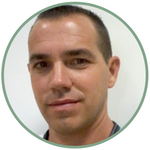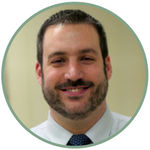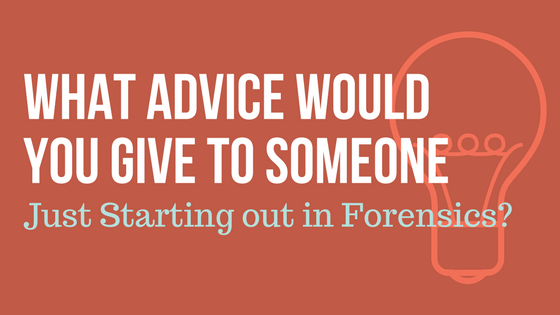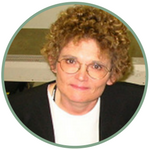Maybe you’ve just graduated and are looking for your first job in forensics, or maybe you’re just starting work as an analyst. Either way, trying to find your footing can be tough. That’s why we’ve asked our ISHI 28 speakers to share some pearls of wisdom for those just starting out in the field of forensics. Do you have tips to add? Join the conversation on our Facebook and Twitter pages!
“Be honest and do the right thing.”
 Chantal Frégeau, Royal Canadian Mounted Police
Chantal Frégeau, Royal Canadian Mounted Police
“Adopt good work ethics and follow the highest standards possible even though your work description or mandate does not include court appearances. Your work/performance will follow you throughout your career regardless of your position in an organizational chart.
Consider yourself a permanent student. There is always something new to learn about DNA typing analysis or another discipline to broaden your knowledge. If you read the scientific literature on a regular basis you may be made aware of new methods and tips to adopt to enhance the work performed in your own forensic laboratories.
Even though you may be performing routine/automated tests, always stay alert. Troubleshooting results that look abnormal will be made easier and understanding your results is very rewarding!”
 Scott Kennedy, University of Washington
Scott Kennedy, University of Washington
“Never stop learning. One of my rules in life is to learn at least one new thing a day.”
 Sylvain Hubac, Forensic Science Laboratory of the French Gendarmerie (IRCGN)
Sylvain Hubac, Forensic Science Laboratory of the French Gendarmerie (IRCGN)
“Just apply this quote: “Simplicity is the ultimate sophistication” (Leonardo da Vinci), is the secret of success!”
 Cristina Rentas, DNA Labs International
Cristina Rentas, DNA Labs International
“Never be afraid to think outside of the box. At times, as a casework analyst, we tend to process the evidence using the technologies we have available in our laboratory at the time and not consider other options that may benefit the case. My least favorite thing to hear when a person asks the question “why?” is the answer “that’s the way it has always been done”. Now, we all can’t be Watson and Crick, but progress cannot be made if we keep doing things because “that’s the way it has always been done”. New ideas are the driving force behind the field of forensics and they lead to new technologies that give us the ability to solve crimes that we never would have been able to in the past.”
 Mike Yakoo, Program in Biomedical Forensic Sciences, Boston University School of Medicine
Mike Yakoo, Program in Biomedical Forensic Sciences, Boston University School of Medicine
“Trust, but verify. Hands down the best advice I’ve ever received.”
 Mandy Fashano, Columbus Police Forensic Services Center
Mandy Fashano, Columbus Police Forensic Services Center
“Take training as serious as possible and really listen to what your trainer tells you. Training is the best time to make mistakes (we are all human after all) and figure out what works best for you. What we do is serious work and makes a difference in people’s lives so you need to take what you do seriously and show up to work every day ready to go, but also know your limitations. Take mental health days, stay at your desk if you are not feeling well, and always remember that mistakes will always happen, it is how you learn from those mistakes that matter.”
Colleen Fitzpatrick, Identifinders International
“Sit in on as many cases studies as you can! Learn the ropes! Be fascinated! Get a degree in forensic science. At the same time, educate yourself about the larger issues we face as forensic practitioners. Definitely attend ISHI to meet the experts. Come up to speed on how we are working together to improve forensic methodologies. Learn everything you can. Be well-informed.”
James Landers, University of Virginia, Department of Chemistry
“Obtain a degree that meets with your career goals – pursue a MS in forensic science if you see yourself in the lab, a PhD if you want to pursue higher positions as a manager, leader or director.”
 Rachel Oefelein, DNA Labs International
Rachel Oefelein, DNA Labs International
“Get an internship! It is much easier to get hired if you have an internship going into the job market. Also, get experience in a laboratory, your first job doesn’t have to be your dream location but if you get experience in a laboratory and get your feet wet in forensics it will make your career options expand in the future.”
Jody Hynds, Orange County District Attorney’s Office
“Know your validations
Stay curious
Don’t be scared of testimony. It’s an integral part of the job. Embrace it.”
 Paul Berry, Louisiana State Police
Paul Berry, Louisiana State Police
“I would say the best advice I have received is “it’s not your job to put someone behind bars. It’s your job to do the science to the best of your abilities and let the results speak for themselves.” I believe too many times forensic scientists feel like an additional arm of the prosecution. It may be true that MANY times our results aid in the prosecution of criminals, but OTHER times our results help show the suspect may NOT have had anything to do with the crime.
The other thing I would say is to try to distance yourself from the crimes themselves. The rape of a three year old is absolutely terrible. But in the beginning I would find myself taking the case scenarios home with me and lamenting over the heinous nature of crimes. I would often become depressed simply thinking about them. What I’ve tried to do over time is recognize that my position as a forensic scientist allows me the possibility in aiding to the justice of crimes. I would do the best I could to use the science to resolve the crimes and help give the victims the peace that could come with closure or resolution.”
“I have 3 tips I would give someone just starting out in the forensic field.
Know what you’re getting into! Forensics is not the glamourous CSI TV show. Talk to a professional in the field to get an expectation of what the job is really like.
Have a solid foundation in your scientific field. Forensic-specific courses are important, but you must have a solid foundation in your field. I would recommend an undergraduate degree in chemistry/biochemistry or biology/molecular biology if you would like to enter the forensic field as a forensic chemist or forensic biologist. You can always learn forensic applications or specialize with a master’s degree, but a solid foundation in biology/chemistry will go so much further.
If you can’t find your “dream” job right away, do not be discouraged. Always take a job that will help build your training/skills to apply for the job you want in the future. Just be patient, gain experience, and eventually you will find that job. And you never know…you may end up down a path you never thought you’d go!”
 Michael Marciano, Forensic and National Security Services Institute, Syracuse University
Michael Marciano, Forensic and National Security Services Institute, Syracuse University
“Always remember that fundamental science underlies the methods and practices used in forensic science. Keep as current as possible and never forget that you are an applied scientist.”
Jonathan Adelman, Forensic and National Security Services Institute, Syracuse University
“The best advice I’ve ever received – and I think this broadly applies to all the sciences – is to repeatedly expose yourself to other ways of learning, thinking, and doing. Many important problems are already solved in a different discipline, just waiting to be discovered and implemented.”
WOULD YOU LIKE TO SEE MORE ARTICLES LIKE THIS? SUBSCRIBE TO THE ISHI BLOG BELOW!








